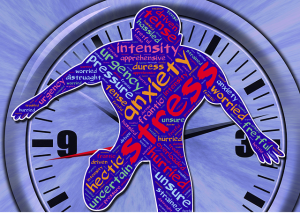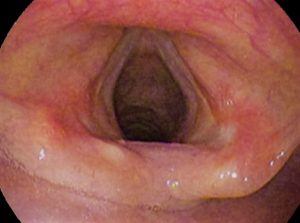What is Vocal Cord Dysfunction?
With vocal cord dysfunction your vocal cords don’t work properly and this can affect your breathing system because the vocal cords close over, or narrow at the wrong time when breathing, making it harder to get air into your lungs. It is often misdiagnosed as exercise-induced asthma and it is easy to confuse it with that because both conditions have similar symptoms. Vocal cord dysfunction can occur at any age but happens more commonly in teenagers and young adults. It is a serious disorder because your vocal cords are not functioning properly on the in-breath (inspiration). People with asthma may also have vocal cord dysfunction when breathing in. When you breathe in, your vocal cords ought to be wide open to allow air to flow to your lungs, but instead they are closed or partially closed. It is thought that maybe 1 in 20 of severe asthma sufferers may also have VCD and as much as 40 % of those thought to suffer from asthma may actually have VCD, although this may be in combination with asthma.
What are the vocal cords?
The vocal cords are what help us to speak. They are tough bands of sinew that vibrate to make noise and this vibration is what allows us to talk and sing. These folds of tissue stretch across your voice box and relax during normal breathing, letting air pass through the trachea (air tube). Vocal cords can be damaged just from dryness, which is why singers always ensure they are well hydrated. While breathing, (exhaling or inhaling) the vocal cords remain apart but they close and vibrate over the airway to make sound when you are talking. In people with VCD, the vocal cords close over the airway just with breathing, making it extremely difficult to get a breath. In other words, the vocal cords are closed when they should be open.
Watch the Vocal Cords working
Is it the same as Asthma?
Because the symptoms of VCD are similar to those for asthma, that is, wheezing, coughing and shortness of breath, vocal cord dysfunction can be misdiagnosed as asthma. Just as with asthma, symptoms of vocal cord dysfunction can be triggered by exercise, by breathing in irritants, such as smoke or fumes or by having a cold. Asthma is an inflammatory disease of the airways and is commonly associated with symptoms of chest tightness, shortness of breath, coughing and/or wheezing and the symptoms can change over time. It affects about 17 to 20 million Americans and is a leading chronic illness among children and adolescents in the United States. It is the most common cause of childhood ER visits and is related to a number of factors, including family history, smoking, stress and allergies.
Asthma is a reversible airway disease and can be chronic or intermittent. It is characterized by variable and reversible airway obstruction and inflammation of the airways. It is a problem that occurs on expiration (breathing out) caused by a narrowing of the airways and an increase of airway resistance. It is a diagnosis that often is given to those with VCD and can co-exist in some patients.
How can you tell the difference?
Vocal cord dysfunction does not respond to asthma treatment, even though the symptoms may be similar to those of asthma. It may coexist with asthma and can make asthma look worse than it is. Vocal cord dysfunction does not respond to inhaler treatment.
What are the symptoms of VCD?
In children, vocal cord dysfunction is often seen in competitive athletes and can lead to a need for oxygen after finishing exercise. It can mimic exercised-induced asthma because both conditions have similar symptoms. A sudden attack may need emergency room treatment. At its worst, it may lead to a spasm in the larynx (voice box) – laryngospasm . The common signs are:
* Shortness of breath or feeling that it’s hard to get air in and out
* Frequent coughing or throat clearing, or feeling that you are choking
* Noisy breathing, with a raspy or wheezing sound and hoarse voice
Unlike snoring, it does not usually happen when you are sleeping.
What causes VCD?
There are a lot of possible causes but often, no cause in particular is found. An attack can be caused by exercise, or by having a cold, or by tobacco smoke, strong smells or fumes. It can also be caused by acid reflux (GERD) or by stress. The muscles of the vocal cords can weaken over time as we age, so it may also appear in older people.
How do I know if I have VCD?
Vocal cord dysfunction can be hard to detect, often because people are just assumed to have asthma when they wheeze. The triggers for asthma and VCD are very similar and there is no specific test for either asthma or VCD. But it should be suspected when you have breathing problems, or are short of breath, and asthma medication does not work.
When people have had an exercise induced cough and wheezing after exercise, it has often been assumed in the past that they had asthma. There is no good diagnostic test for asthma, with the presence of a cough and wheeze generally having been considered to be sufficient diagnosis. The vocal cords may show decreased movement. They can usually be seen using a mirror placed at the back of the tongue. The Royal Brompton Hospital in London is investigating VCD with the use of a small camera that watches the vocal cords while you do exercise. The tiny camera is threaded up your nose after the area has been numbed with local anaesthetic. It sits at the top of your nose and looks down on the vocal cords and provides a picture of them while you are speaking and exercising. As VCD often occurs during or after exercise, the patient is sat on a stationary bike and asked to pedal. The vocal cords are observed while the person works quite hard and also when they speak. The cough and wheeze do not respond to asthma medications.
Very often, someone with VCD will wheeze when they breathe IN, whereas those with asthma may wheeze when they breathe OUT. It is possible to suffer from both asthma and VCD.
What is the treatment?
Treating underlying conditions that might be triggering your vocal cord dysfunction can help reduce symptoms but voice therapy is recommended to help ensure easier breathing and better breath control. Techniques to control breathing and calm down spasms of the vocal cords are the mainstay of treatment. In addition, visual imaging techniques are taught as a method of keeping the vocal cords open during rapid breathing. Asthma treatment mainly consists of inhalers, whereas VCD treatment is a form of physiotherapy which teaches breathing control. Often 3 or 4 sessions are booked but the sufferer may well find they can control their breathing well even after just the first session. If you have VCD, it is important to know this, as the use of the blue inhaler often provided to asthma sufferers can actually make the airways respond less well over time in those who do not have asthma.





